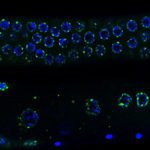Lien vers Pubmed [PMID] – 20657770
PLoS ONE 2010;5(7):e11659
UNLABELLED: Persistent immune activation plays a central role in driving Human Immunodeficiency Virus (HIV) disease progression. Whether CD4+CD25+ regulatory T cells (Tregs) are harmful by suppressing HIV-specific immune responses and/or beneficial through a decrease in immune activation remains debatable. We analysed the relationship between proportion and number of regulatory T cells (Tregs) and immune activation in HIV-infected patients interrupting an effective antiretroviral therapy (ART). Twenty-five patients were included in a substudy of a prospective multicenter trial of treatment interruption (TI) (ANRS 116). Proportions and numbers of Tregs and the proportion of activated CD4 and CD8 T cells were assessed at baseline and month 12 (M12) of TI. Specific anti-HIV CD4 and CD8 responses were investigated at baseline and M12. Non parametric univariate analyses and multivariate linear regression models were conducted. At baseline, the proportion of Tregs negatively correlated with the proportion of HLA-DR+CD8+T cells (r=-0.519). Following TI, the proportion of Tregs increased from 6.3% to 7.2% (p=0.029); absolute numbers of Tregs decreased. The increase in the proportion of HLA-DR+CD38+CD8+T cells was significantly related to the increase in proportion of Tregs (p=0.031). At M12, the proportion of Tregs did not negatively correlate with CD8 T-cell activation. Nevertheless, Tregs retain a suppressive function since depletion of Treg-containing CD4+CD25+ cells led to an increase in lymphoproliferative responses in most patients studied. Our data suggest that Tregs are efficient in controlling residual immune activation in patients with ART-mediated viral suppression. However, the insufficient increase in the proportion and/or the decrease in the absolute number of Tregs result in a failure to control immune activation following TI.
TRIAL REGISTRATION: ClinicalTrials.gov NCT00118677.
